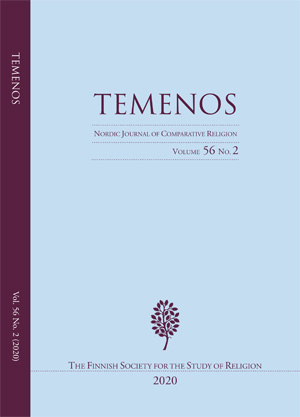Knowing, Being, and Doing Religion
Introducing an Analytical Model for Researching Vernacular Religion
DOI:
https://doi.org/10.33356/temenos.97275Keywords:
Vernacular religion, Jewish studies, Jews in Finland, Doing religion, Ethnography, Everyday religion, Minhag FinlandAbstract
This article introduces a new analytical model for researching vernacular religion, which aims to capture and describe everyday religiosity as an interplay between knowing, being, and doing religion. It suggests three processes that tie this triad together: continuity; change; and context. The model is envisaged as a tool for tracing vernacular religion in ethnographic data in a multidimensional yet structured framework that is sensitive to historical data and cultural context, but also to individual narratives and nuances. It highlights the relationship between self-motivated modes of religiosity and institutional structures, as well as influences from secular sources and various traditions and worldviews.
The article is based on an ongoing research project focusing on everyday Judaism in Finland. The ethnographic examples illustrate how differently these dynamics play out in different life narratives, depending on varying emphases, experiences, and situations. By bringing together major themes recognized as relevant in previous research and offering an analytical tool for detecting them in ethnographic materials, the model has the potential to create new openings for comparative research, because it facilitates the interlinking of datasets across contexts and cultures. The article concludes that the model can be developed into a more generally applicable analytical tool for structuring and elucidating contemporary ethnographies, mirroring a world of rapid cultural and religious change.

Downloads
Published
How to Cite
Issue
Section
License
Copyright (c) 2020 Ruth Illman and Mercédesz Czimbalmos

This work is licensed under a Creative Commons Attribution 4.0 International License.
Author's Guarantee
- The Author acknowledges that the Work will be publicly accessible on the Internet and that such access will be free of charge for the readers.
- The Author guarantees that the Work is her/his original work that has not been published before and cannot be construed as copying or plagiarism. Furthermore, the Author confirms that the Work contains no statement that is unlawful, defamatory or abusive or in any way infringes the rights of others.
- The Author confirms that she/he has secured all written permissions needed for the reproduction in the Publication of any material created by a third party.
User Rights
Under the CC BY 4.0 license, the Author/s and users are free to:
- Share — copy and redistribute the material in any medium or format,
- Adapt — remix, transform, and build upon the material for any purpose, even commercially,
- However, the Work must be attributed to the original Author and source of publication.
The license of the published metadata is Creative Commons CCO 1.0 Universal (CC0 1.0)
Author Rights
The Authors maintain the right to:
- copyright, and other proprietary rights relating to the Work,
- the right to use the substance of the Work in future own works,
- the right to self-archiving/parallel publishing (publisher's PDF allowed).
Rights of Publisher
- The Publisher reserves the right to make such editorial changes as may be necessary to make the Work suitable for publication in the publication, e.g. style of punctuation, spelling, headings and the like.
- The Publisher will publish the Work if the editorial process is successfully completed and reserves the right not to proceed with publication for whatever reason.
- The publication entitles the author to no royalties or other fees. This agreement will be governed by the laws of Finland.






